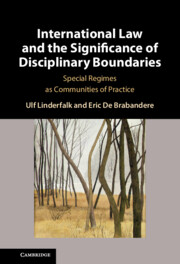 International Law and the Significance of Disciplinary Boundaries
International Law and the Significance of Disciplinary Boundaries Published online by Cambridge University Press: 21 November 2024
Chapter 2 explores how Etienne Wenger’s theory of communities of practice translates to the context of international law and the concept of a special regime. According to Wenger, a community of practice is defined by the presence of three structural elements: there must be a mutual engagement of community members; community members must be engaged in a joint enterprise; and they must have a shared repertoire. Chapter 2 draws up the contours of a methodology that will help the classically trained legal scholar to justify propositions categorizing segments of the international legal system as special regimes, based on the idealist’s conception of a special regime. As the chapter demonstrates, the task needed to justify a suggestion that some subpart of the international legal system is a special regime is not significantly different from many investigations that classically trained legal scholars are already conducting, more or less as a matter of course.
To save this book to your Kindle, first ensure [email protected] is added to your Approved Personal Document E-mail List under your Personal Document Settings on the Manage Your Content and Devices page of your Amazon account. Then enter the ‘name’ part of your Kindle email address below. Find out more about saving to your Kindle.
Note you can select to save to either the @free.kindle.com or @kindle.com variations. ‘@free.kindle.com’ emails are free but can only be saved to your device when it is connected to wi-fi. ‘@kindle.com’ emails can be delivered even when you are not connected to wi-fi, but note that service fees apply.
Find out more about the Kindle Personal Document Service.
To save content items to your account, please confirm that you agree to abide by our usage policies. If this is the first time you use this feature, you will be asked to authorise Cambridge Core to connect with your account. Find out more about saving content to Dropbox.
To save content items to your account, please confirm that you agree to abide by our usage policies. If this is the first time you use this feature, you will be asked to authorise Cambridge Core to connect with your account. Find out more about saving content to Google Drive.